Dell XPS 15 Haswell Edition: QHD+ with a Refined Design
by Jarred Walton on March 6, 2014 7:00 AM ESTDell XPS 15: General Performance
With all the talk of potential throttling, some of you might be concerned with general performance – and again, let me reiterate that a reboot appears to clear the problem, so hopefully Dell’s engineering time can track down the root cause in the coming days/weeks and fix it. Even if they can’t/don’t, the reality is that in most cases the throttling is a complete non-issue. PCMark and other tests that hit the CPU never showed any problems, and even most of the other graphics testing that I ran didn’t have problems. Of course, with a reboot apparently being a workaround, that’s not too surprising.
As you would expect from the hardware, the high-end model of the XPS 15 that we’re testing runs plenty fast and should satisfy anyone short of extreme performance types. If you want more CPU power in a laptop, you’ll basically need to get something quite a bit thicker and heavier, and even then the top model i7-4930MX/4940MX are only about 25% faster in practice (4.0GHz maximum Turbo Boost vs. 3.2GHz). The 512GB SSD also helps keep things running smoothly, 16GB RAM should be sufficient for quite some time (outside of perhaps running lots of VMs or a few other specific workloads), and when needed the GT 750M is waiting in the background to help with graphics/compute tasks. Here’s a look at our general performance testing results, which have been updated to use the latest versions of 3DMark11, 3DMark (2013), PCMark7, and PCMark8 along with Cinebench 11.5 and x264 HD 5. PCMark8 v2 scores are not (entirely) comparable with the earlier release, so for now we only have this one system tested, but that will change in time.
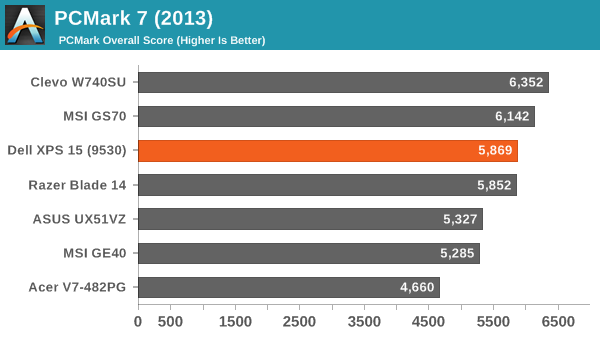
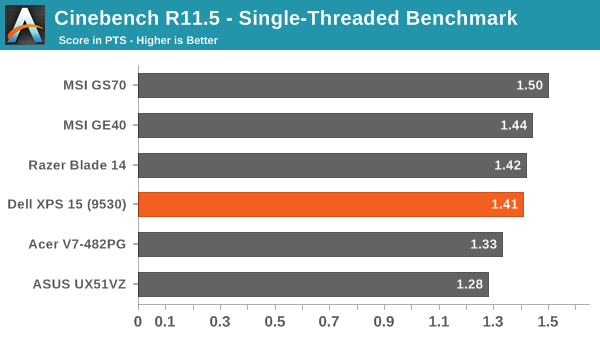
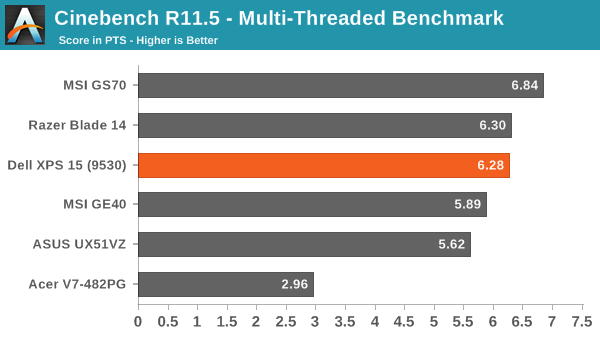
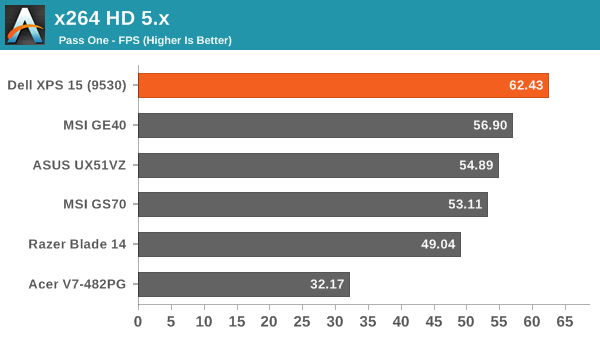
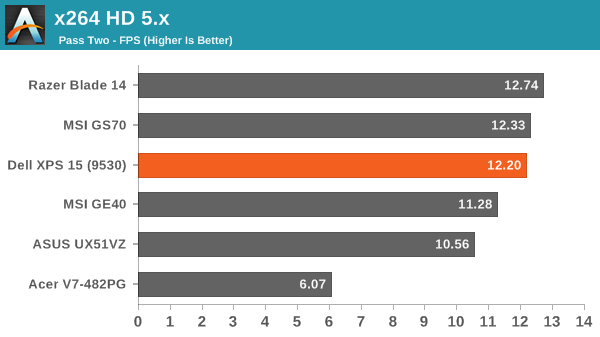
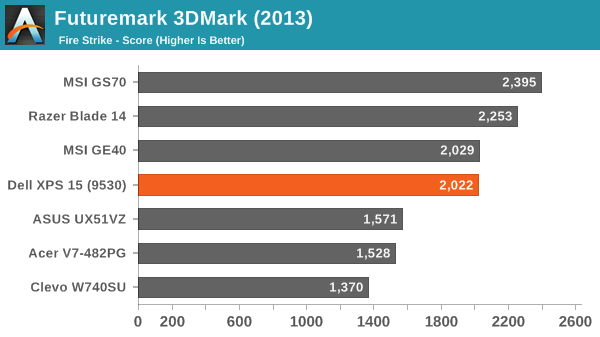
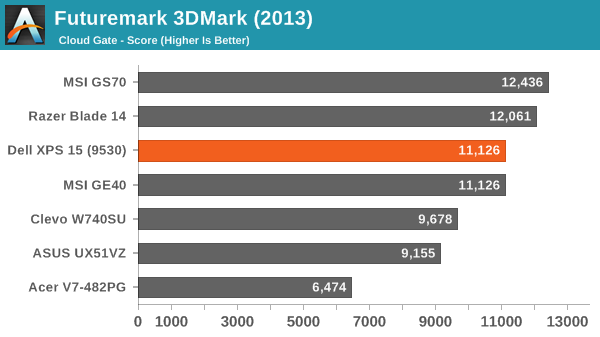
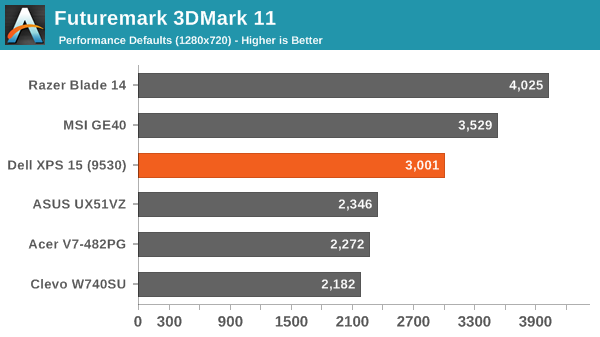
There’s really not much to say about overall performance. The new Dell XPS 15 may not be the absolute fastest laptop around, but it’s certainly a capable offering that can handle any reasonable load most users might want to run. If you need more performance, you likely knew before even looking at these graphs that that would be the case. As a premium consumer/business laptop, I know plenty of people that would be quite please to have one of these to tote around.










152 Comments
View All Comments
callmesissi - Friday, March 7, 2014 - link
Great review. I'd like to ask you WHY do you keep comparing Windows products to MAC products. In real life you cannot do in a mac what a windows machine can, and dont get me started on "simulation software", if you do run windows on top of mac add the cost of windows license + simulation software and then benchmark the mac and lets see how fast it is by running that.Dont get me wrong, this is NOT a "i hate mac" post. But for a living i repair and give technical support to windows machines, and you CANT do everything that you can do in a windows pc on a mac. from hardware to software. for example my main client has quite a few stores + the central base and the radio software (win only) the printers (win only) the accounting software (win only) and so on...
I do hope you review Mac as a Mac versus other mac and not versus a windows pc. Macs are pretty much good for any user that does not use it for work, or business that use some specialized software like pilots, navigation, design and that's pretty much it.
I know it wont be long where we wont have that windows / macOS / android / ios / etc. problems, future is aiming for an open source, html based software that can run on any platform. but this is today and as of today you simply CANT use a Mac to replace a pc.
And not to mention a pc gamer... how many games are on a Mac?...
Please, just compare apples to apples (pun intended) or if you do, then add parallax + windows to the mac and then set benchmarks. Windows has support for like a 1,000,000 things more than a mac does.
my two cents.
Ma Deuce - Friday, March 7, 2014 - link
It's extremely easy to run windows on a mac... Saying that you can't replace a pc with a mac is just completely false.My line of work requires me to use several Windows only programs, and none of them have issues running on my macbook pro.
About the only thing you can't do is make a good living providing repairs and technical support to mac owners, they just don't have as many issues lol
Penti - Saturday, March 8, 2014 - link
Plenty of enterprises run Windows on Apple machines, support-people shouldn't be unaware of that, guess he's never heard of bootcamp or for that matter knows what parallels is. A mac is a qualified machine for volume licensing. Corporations can just stream their business apps from their TS/RDS/Citrix environment rather then let users who use OS X virtualize Windows. The only thing you really can't do is remote control everything like on vPro/iAMT-machines but the same goes for this Dell. For a end user, a Windows license is about 100 dollars. For business it's pretty much the same as including any other machine in your volume licensing program. If you need Parallels it's 70-80 dollars. A small business can run Windows only accounting software just fine, the virtualization software will make it launch from the dock just like any other program if you like to do that, some OS X users can use business and accounting software that run natively. It's really not an issue any more. It mixes really well with a Microsoft server environment, regardless which OS you choose to run albeit some extra software is required to administrate the OS X-machines with ease.For a end user who wishes to legally use Windows on their mac it's just the 100-200 dollars extra. Even with that extra cost a MBAir and so on usually does very well against semi-expensive Windows-powered Ultrabooks. If they do choices that makes it worse then it need to be at the price point it's worth taking note. Even if most mac users prefer to use OS X for 90% of work. There is also some software for OS X in a few professional fields that aren't available for Windows and has no alternative. You really can't treat them like say if they wore a ARM-based tablet, hardware-wise it's totally comparable and sites like this one do benchmark on Windows too. Prices and price ranges are easy to compare too.
robco - Thursday, March 13, 2014 - link
Comparisons of high-end Windows laptops with MacBooks is inevitable. Apple's industrial design is considered to be the best in the business. The price difference between the model reviewed here and the comparable rMBP config is $170. The Mac has Thunderbolt (which gives you GigE with an adapter), plus Apple has their own OS. Dell's support is less expensive though.As for not being able to use it for work, I know many people who would disagree. Most web devs I know (who don't use .NET) use Macs. Same with most mobile app devs (required for iOS, much easier to set up Android SDK on OS X vs. Windows). Not to mention quite a number of A/V pros. As for most general business tasks, a Mac can do those just fine - just not necessarily with the exact same software. Most F/OSS is *nix based and OS X is UNIX. Unlike other *nix systems, OS X has a fair amount of commercial software as well.
If you are buying a system primarily for gaming, then of course you want a Windows box. But even that is changing. Check out Steam or even the Mac App Store and you will see quite a few titles available. For everything else, there's BootCamp.
Ultimately a computer is a tool. Use the best tool for your needs. But understand that the needs of others may be quite different from yours. For me and my needs, a Mac works better. However I understand that for many, the opposite is true. But quite a number of people (including the primary author of this site), find Macs to be quite useful for getting "real" work done...
blzd - Friday, March 7, 2014 - link
Never buying another one of these after the 15z battery would die after 1 year almost exactly.tviceman - Friday, March 7, 2014 - link
Maxwell is jumping and screaming to get put inside this chassis!augiem - Saturday, March 8, 2014 - link
It would have been nice to see mbpr in some of the tests and benchmarks where applicable. After all, that's what this thing is trying to be. At the very least on the screen tests and battery life charts.JPDiueholm - Saturday, March 8, 2014 - link
Did you encounter any problems like:http://en.community.dell.com/support-forums/laptop...
Which has rendered the XPS 13 unusable!
petar_b - Saturday, March 8, 2014 - link
It would be nice to compare the above mentioned DELL notebook with ASUS NV550 touch screen. They have almost identical hardware, both come with SSD, however AUSU kept optical drive (blu ray burner), and still has two fans (one for each PU). for the height of 8mm-18mm DELL sacrifices optical drive, while ASUS kept height of 27mm (and has lots of empty space below, I am sure asus could save 3-4 mm if the case was closer to components. Price of asus is aprox 1200eu while dell is 2000 eu. Not sure if dell is overpriced...Flying Goat - Saturday, March 8, 2014 - link
Hmm...I can't find anything about an "NV550". Looks to me like the Asus N550 (No V) weighs 6 pounds, not 4.5, has a mechanical HDD, and a standard resolution screen, also does not have 802.11ac (Though it does have an ethernet port), so not at all comparable, except perhaps in terms of video card and CPU. If you don't care about the weight or the high res screen, then you shouldn't buy the Dell, but if that's what you want, the price seems competitive with comparable models.The ASUS model you should be comparing it to is the ASUS Zenbook UX51Vz-XH71, which costs $2400 (More than the Dell). It's also light, and has high res monitor. However, it has previous generation CPU/GPU (Ivy Bridge, 650GTX), no touch screen, only 8 GB RAM, no 802.11ac, and marginally lower resolution monitor. Only things it has going for it are an ethernet port and bing only 4 pounds instead of 4.44. Anyhow, given that price, I'd call the Dell's pretty competitive, if you want a light gaming laptop with a high res screen - there aren't a lot of models that fit that bill.
If you want a gaming laptop, but don't care about the weight, and are happy with a lower resolution screen, the price premium may not be worth it.